|
|
|
Sort Order |
|
|
|
Items / Page
|
|
|
|
|
|
|
| Srl | Item |
| 1 |
ID:
152574
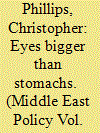

|
|
|
| 2 |
ID:
128610
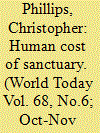

|
|
|
| 3 |
ID:
187373
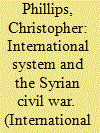

|
|
|
|
|
| Summary/Abstract |
How does the international system impact a civil war? Does polarity affect the war’s outbreak, character and how long it lasts? Systemic Realists argue multipolarity makes inter-state war more likely, but is this also true of intra-state war? Using the Syria conflict (2011-present) as a case study, this article suggests a connection can be found. It argues that the end of US-dominated unipolarity, and its interaction with a new multipolarity in the Middle East region impacted the behaviour and calculations of foreign states involved, contributing to the outbreak of war and how it progressed. The same interacting multipolarity paradoxically also shaped Russia’s decision to intervene in 2015, ultimately edging the war towards a conclusion, something that Systemic Realists would not expect. This study of the systemic effects in the Syria conflict suggests that the Neo-Realist concept of polarity continues to have relevance and can be useful in understanding intra- as well as inter-state conflict. It points to the importance of the interaction between regional and global systems in generating these effects, and it suggests a reconsideration of the Neo-Realist view that multipolarity always makes wars harder to end.
|
|
|
|
|
|
|
|
|
|
|
|
|
|
|
|
| 4 |
ID:
131284
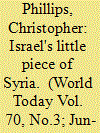

|
|
|
| 5 |
ID:
086948
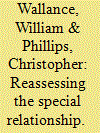

|
|
|
|
|
| Publication |
2009.
|
| Summary/Abstract |
The resignation of Tony Blair as British Prime Minister and the transition from Bush to Obama in the US mark the end of the second revival of the US-UK special relationship. The classic era of the special relationship began under the Labour government in the 1940s, though it was Winston Churchill who inspired the concept. It ended with the resignation of Harold Macmillan in 1963. Margaret Thatcher revived close personal relations with the US President as a guiding principle of UK foreign policy and Tony Blair successfully revived them again, even though the end of the Cold War had transformed the framework of transatlantic relations. Over the past 60 years US-UK relations have embedded specific security arrangements which have persisted, largely unquestioned, through the ups and downs of political relations at the top: close links between the two countries' armed forces; access to defence technology and procurement; intelligence ties through the UKUSA Agreement; a semi-independent nuclear deterrent and provision of military bases in the UK and its overseas territories. Public debate on the costs and benefits of these links has been limited; successive governments have discouraged a wider debate. The Obama administration enters office with few of the personal ties to Britain and to English culture, which have underpinned the special relationship. Earlier US administrations have approached relations with the UK from the perspective of US interests, while many British political leaders have felt-and have hoped to find in Washington-a sentimental attachment to Anglo-American partnership. British foreign policy would benefit from a reassessment of the structures of US-UK relations in terms of British interests, costs and benefits.
|
|
|
|
|
|
|
|
|
|
|
|
|
|
|
|
| 6 |
ID:
137740
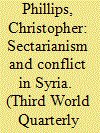

|
|
|
|
|
| Summary/Abstract |
This article challenges the sectarian narrative of Syria’s current civil war, which relies on several false assumptions about the nature of political identity. It first questions how sectarian the uprising and civil war actually are, suggesting that the conflict is ‘semi-sectarian’, given the multiple other fault lines of contention, notably class, ideology and other non-sect, sub-state ties. It then draws on the theoretical debates between primordialists, ethno-symbolists and modernists to historicise political identity development in Syria. In doing so, it reasserts the modernist case, emphasising how political identities in Syria, both national and sectarian, have developed in a complex interrelated manner in the modern era and how the recent violent mobilisation of sectarian identity is the result of long- and short-term structural, economic, socio-cultural and political factors rather than unchanging ancient animosities. Of these, the most vital remain structural changes and elite reactions to them, with the prospect of state collapse in Syria’s future the most likely cause of a descent into further sectarian chaos.
|
|
|
|
|
|
|
|
|
|
|
|
|
|
|
|
| 7 |
ID:
152573
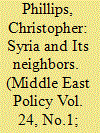

|
|
|
| 8 |
ID:
114098
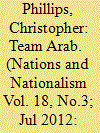

|
|
|
|
|
| Publication |
2012.
|
| Summary/Abstract |
The linking of living rooms across state borders by al-Jazeera and other pan-Arab satellite television channels has prompted claims that a 'new Arabism' that undermines state nationalism is emerging. Until now, analysts have mostly focused on the 'hot' Arabism in the news coverage of politicised events such as the Israel-Palestine conflict. This article offers a new dimension by suggesting that as important to satellite television's construction and reproduction of Arab identity is the everyday discourse found in less overtly political programmes such as sport. To demonstrate this, it offers an analysis of al-Jazeera's coverage of the 2008 Beijing Olympics showing how the broadcasts address viewers as a common Arab audience who are simultaneously encouraged to be nationalistic towards their separate nation-states within a given 'Arab arena' of states with whom they should primarily compete. This suggests that new Arabism should in fact be considered a 'supranationalism', not a revived Arab nationalism as it simultaneously promotes Arab and state identities in tandem. Finally, it aims to expand our understanding of 'everyday nationalism' by adapting Michael Billig's theory and methodology of 'banal nationalism' in British newspapers to facilitate the study of sport on supranational Arab identity on satellite television.
|
|
|
|
|
|
|
|
|
|
|
|
|
|
|
|
| 9 |
ID:
159360
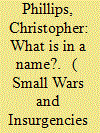

|
|
|
|
|
| Summary/Abstract |
Post-uprisings Middle East politics is frequently described as a ‘regional cold war’ involving proxy warfare that emphasises the role of shared identities linking external and local actors. But does the ‘content’ of identities impact proxy war dynamics? This article considers the present ‘battle for Syria’, a local conflict that became a theatre for multiple proxy wars involving actors emphasising identities on various levels, most notably national, religious/ sect and ethnic. It suggests that identity content does matter, with global powers more reluctant than regional players to back groups identifying at sub-national level, while foreign non-state actors are enthusiastic backers of sub-national identity.
|
|
|
|
|
|
|
|
|
|
|
|
|
|
|
|
|
|
|
|
|